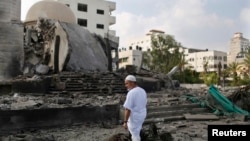Based on past experience, here is the likely outcome of the current Israeli-Palestinian fighting:
A cease-fire will come in a few days – perhaps by Monday when the fasting month of Ramadan ends – and will last for a year or two. Another confrontation will follow, once Hamas has replenished its store of rockets and rebuilt tunnels to infiltrate Israeli land.
Israel eventually will trade hundreds of Palestinian prisoners for the body of at least one Israeli soldier who has gone missing in the current conflict. Hamas will try to seize more Israelis – alive or dead – to bargain for more of its prisoners.
Organizations which are even more ideologically extreme than Hamas will benefit from the fighting. They include Palestinian Islamic Jihad and the Islamic State, the group that now occupies a third of Syria and a major chunk of Iraq.
Hamas, however, will claim it is the “victor,” pointing to the disruption it has caused to ordinary Israelis and the relatively large number of Israeli military casualties.
Europe impact
Anti-Israel sentiment will rise in Europe as a result of the lopsided Palestinian-Israeli death toll. More European Jews may immigrate to Israel, but fewer American Jews will do so and more and more Israelis will seek to come to the United States, which is already home to half a million Israeli citizens.
Global and regional leader leaders will talk about the need to resolve the underlying issues – as Secretary of State John Kerry did today in Cairo – but will continue to try to manage the crisis, not resolve it.
Israeli officials refer to their periodic onslaughts on Gaza and in the past, on Lebanon, as “mowing the grass.” This metaphor dehumanizes the thousands of Arab civilians killed by Israel’s superior, U.S.-augmented firepower.
It does, however, reflect the chronic nature of the conflict and the likely reality that it will not end in the foreseeable future.
A few years ago, I wrote an article entitled, “Should Israel Become a Normal Nation?”
In the article, I defined a “normal” Israel as one that “would conclude a comprehensive peace agreement relinquishing most of the occupied territory, forswear massive military strikes on adversaries unless facing an equivalent threat, and acknowledge its nuclear status.”
Peace chances fading
The chances to achieve that sort of normality were never big and appear to be fading fast.
Born in warfare, Israel was able to achieve peace agreements with Egypt and Jordan by trading land for peace.
But Israel lost its best opportunity to end the conflict with Syria more than a decade ago when that country was still a coherent nation governed by a long-time strongman, Hafez al-Assad.
Now Israel looks across its northern border and sees a multi-dimensional sectarian civil war between the minority Alawite regime headed by Assad’s son and a fractured Sunni opposition. In such circumstances, it makes sense to hold on to the Golan Heights as a buffer against chaos.
The Palestinian Authority, meanwhile, was never that strong and is now weaker than it was under the leadership of Yasser Arafat. Israel undermined the Authority during the second intifada by confining Arafat to his headquarters in Ramallah, where he became fatally ill.
Mahmoud Abbas, who succeeded Arafat after the latter died in 2004, does not have the same appeal to the Palestinian population, which remains hobbled by Israeli restrictions and increasingly penetrated by Israeli settlements.
Israel withdrew unilaterally in 2005 from Gaza, but Abbas’s Fatah faction lost parliamentary elections in 2006 to Hamas, which violently took over Gaza the following year.
With the collapse of U.S.-mediated peace talks this spring, Abbas forged a unity government with Hamas in the hope of restoring some coherence to the Palestinian polity, but Israel rejected the agreement as a compromise with what it views as a terrorist organization.
The kidnapping and murder of three Israeli teens in the West Bank in June by a Palestinian clan with tangential ties to Hamas touched off the current cycle of violence.
US role
The Barack Obama administration has defended Israel’s actions as legitimate defense of its own civilian population while growing increasingly concerned about the rising Palestinian death toll. Secretary of State Kerry, the administration’s all-purpose fireman, was sent to mediate a cease-fire with the help of Qatar, Turkey and Egypt.
While Kerry told reporters in Cairo that, “It is imperative that there be a serious engagement, discussion, negotiation regarding the underlying issues and addressing all of the concerns that have brought us to where we are today,” his immediate objectives are minimal.
Kerry wants the fighting to stop so that the adversaries can bury their dead and begin the process of reconstruction, especially in devastated Gaza, where the U.S. has promised an extra $47 million in humanitarian aid.
Kerry’s modest goals after nearly a year of non-stop shuttling for a comprehensive peace reflect the fact that fewer and fewer Israelis and Palestinians believe in a two-state solution.
Both sides see the future as an existential struggle to control the land they unhappily share.
With so many other crises erupting this summer, a kind of numbness is setting in in Washington at the mounting piles of innocent dead.
From farmers’ fields in eastern Ukraine to the killing fields of Syria and Iraq and the pulverized apartments of Gaza, ordinary people are being sacrificed in disputes that their leaders lack the political will to resolve.
There is much talk of “turning points” and “wakeup calls” but it’s hard to foresee more than temporary lulls in the carnage that is roiling so much of the Middle East and beyond.
The most the “international community” can accomplish, it seems, is to tend to the survivors until the next round of fighting and try to strengthen its own defenses against the terrorism that these conflicts inevitably spawn.

